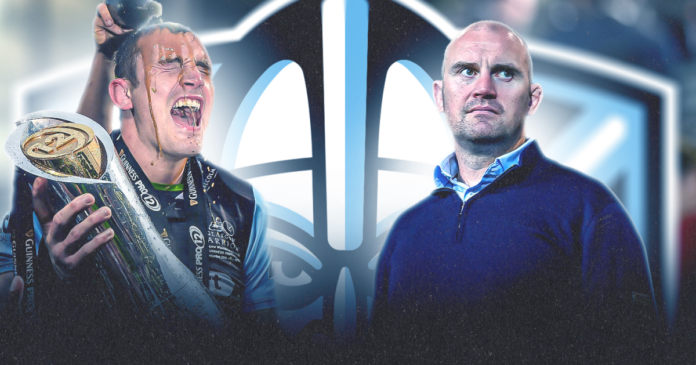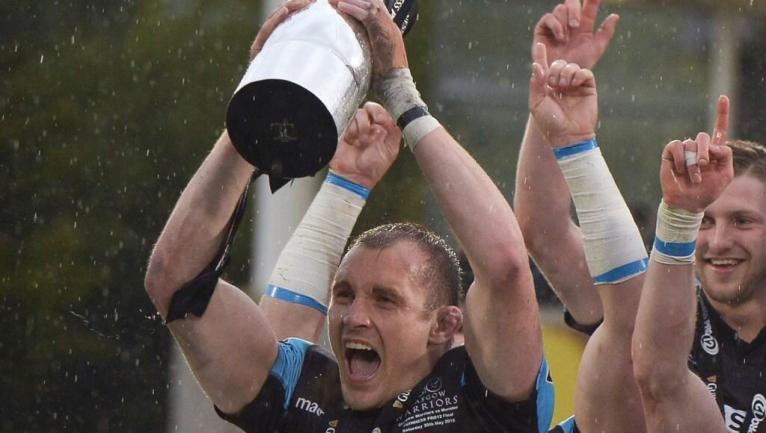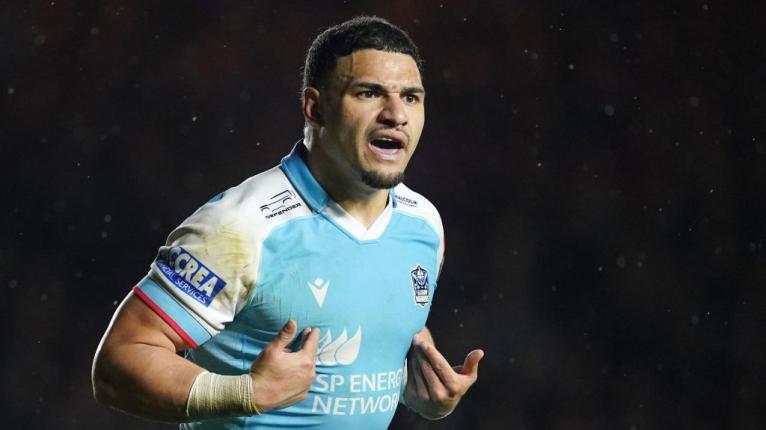
[ad_1]
These days, Al Kellock has an in-tray stacked almost as high as his towering frame. The demands of running the URC’s champion club have him scoping trophy tours and community events, thrashing out new deals with his coveted headliners while batting aside rival advances from across Europe, and the small matter of shifting Glasgow’s traditional festive derby from Scotstoun to Hampden Park, the iconic national football stadium on the other side of the city.
Tangible success comes along so rarely in Scottish rugby, that it cannot be allowed to wither unharnessed. Glasgow are desperate to capture the hearts and minds their extraordinary feats of the past six months so richly deserve. The boys who ran roughshod through Limerick and stormed Fort Loftus have carted the silverware across the country, attended civic receptions and photo ops, but their first Scotstoun match as URC winners did not feel like a grand homecoming. Part of that was down to the backdated timing and Glaswegian weather; part due to Franco Smith’s disdain for such fanfare when there’s a job to be done.
Glasgow Warriors stunned the Bulls to claim the URC trophy in Pretoria back in June (Photo by PHILL MAGAKOE/AFP via Getty Images)
For Smith, the laser focus is on winning the title again, not simply defending it. But those in charge off the field must seize the joy of the present to build for the future. Glasgow are reigning champions. What happens now?
“We take a game to Hampden,” Kellock replies, “and try and use the momentum to put as many people in there and understand we’ve got a phenomenal group, who have had a high degree of success against the world’s best teams. The amount of World Cup winners we beat over that play-off period against the Stormers and Bulls.
“And we’re talking about housing the best players in Glasgow. The entertainment, the way we play the game, for any sports fan you’ll come and enjoy the night. We needed to do something different and we’ve done Hampden.
I struggle for anybody to come and watch one of our games and not think, ‘yeah, I want to come back’.
“The other thing is continuing to tell a story. That was the biggest frustration about winning it away from home. The Premier Sports TV audience is great but it’s already engaged, they are paying to watch it. If we could have got the final on to free to air, people would have realised how big a showcase it was, with 51,000 people there, more than 50,000 of them Bulls fans. We need to tell our story around the size and scale of this.”
The Hampden project is at the heart of the strategy. Glasgow hope to make it an annual event, similar to Harlequins’ ‘Big Game’ concept at Twickenham and Edinburgh’s use of Murrayfield for their leg of the inter-city fixtures. It helps, of course, Hive Stadium is on the Murrayfield campus and the whole lot is owned by Scottish Rugby, while Glasgow are tenants at Scotstoun and must rent Hampden from the Scottish FA. They are also understandably keen to involve the northernmost Caledonia region of Scotland with which the club is aligned.
“There’s a break-even number for Hampden,” Kellock says. “We’ll keep that internal. We’ve seen what Edinburgh have built, 37,900 last year. We’re at year one.
“There’s enough support in the ‘Glasgow Caley’ region to put on some showcase events and that’s what we are looking to do. And then people will want to come and see it more regularly. I struggle for anybody to come and watch one of our games and not think, ‘yeah, I want to come back’.
“I’d love to think there’s a good travelling support from Edinburgh, but also from the rest of our region. One of the reasons for choosing a 3pm kick-off was to give people the ability to travel. If it was a late kick-off, 19:35 on a Saturday night, it closes the door on so many kids – and adults – who live more than 45 minutes out of Glasgow. The pricing categories and kids prices allow people to do it hopefully reasonably affordably.
Our biggest-ever battlefield – all it needs is you 🏟️
Season Ticket Holders and Warrior Nation Members can access their pre-sale window for our 1872 Cup clash at Hampden now, with general sale opening this Friday at 10am – don’t miss out! 🤩 pic.twitter.com/KB5JJw4XJP
— Glasgow Warriors (@GlasgowWarriors) October 22, 2024
“We are working with clubs and schools, particularly the clubs, because there’s unlikely to be much mini rugby on. At West of Scotland RFC there are already buses arranged, we are speaking to Cambuslang and GHA, so they can be hubs as well. Say Aberdeen Grammar want to come down, they could base themselves at Braidholm (GHA’s home) and nip across the road to Hampden.
“Every club in ‘Glasgow Caley’ should be part of Glasgow Warriors. There has to be a tangible benefit to that as well. We will have competitions running so clubs who participate will have players come in to the club, or Franco come in and coach. We need buy-in from the whole of Scotland. This is a whole of Scotland event.”
Kellock captained Glasgow to their previous league title in 2015, the only other time a Scottish club has won a major trophy, and worked as the union’s interim head of commercial before being appointed Warriors managing director in 2021.
Scotstoun does not look radically different from his swansong almost a decade ago. There was a time when Glasgow maxed out the ground’s season ticket allocation and waiting lists for hospitality packages stretched longer than the Clyde. Towards the end of Gregor Townsend’s reign, there was a persuasive argument for the club having outgrown its home. When covid struck and the team faltered, demand fell off, but the numbers are reaching critical mass once more.
A legacy piece from the Commonwealth Games has to be intertwined with us. We are the main tenant, we are spending an awful lot of money to improve the facility.
Scotstoun is owned by Glasgow City Council and though an outdoor fanzone has been introduced, increasing the 7,351 capacity remains a sticking point. The 2026 Commonwealth Games might provide an opportunity, even with rugby sevens struck from its slimmed down programme. Kellock is making his case with the council and Games organisers.
“I’m not frustrated [by Scotstoun’s capacity remaining the same] because we needed to build back up post-covid. We’re now over 4,000 season ticket holders and we sold out eight of 11 games last year in the regular season. Now we’ve got to the point of something having to move again.
“Say they are doing 10 sessions at Scotstoun during the Commonwealth Games, they’ll pack them out, so what’s the smartest thing to do as far as stands are concerned, and is there something we can do to help increase our capacity? Because a legacy piece from the Commonwealth Games has to be intertwined with us. We are the main tenant, we are spending an awful lot of money to improve the facility, so a strong legacy will be full of joined-up thinking. All the conversations I’ve had so far have been very positive.
“We need to prove we have the numbers. I would like us to go incremental, I don’t want us to have a 15,000-seater stadium with no jeopardy for tickets. But if we can prove we have the fanbase there, which we firmly believe we have, then it’s another step along the journey.”
Would a much-mooted British and Irish League propel Glasgow’s quest for more eyeballs and greater recognition?
 Kellock captained a Glasgow team featuring Finn Russell, Jonny Gray and Leone Nakarawa to the 2015 Pro12 title (Photo by Charles McQuillan/Getty Images)
Kellock captained a Glasgow team featuring Finn Russell, Jonny Gray and Leone Nakarawa to the 2015 Pro12 title (Photo by Charles McQuillan/Getty Images)
“We need to make sure we protect the whole of the game of rugby and any changes we make, enhance everything rugby is. There are a lot of positives to [a British and Irish League] but wider conversations to be had.
“I’m a big advocate of what the South African teams bring to the URC. If we can find a structure that enhances rugby against other sports – because we shouldn’t be competing with each other, we should be competing with other sports. How do we make sure rugby gets better as a collective, and not just fixes any local problems?
“We would need to make sure TV broadcast numbers would be enhanced. We can create some real jeopardy across leagues to make sure there are more people watching.
You are fully understanding other clubs are going to be in there for Sione, Danny Wilson and Harlequins being one of them.
“Cultural relevance is something we talk about a huge amount in Glasgow. I’m talking to you from South Africa, the cultural relevance of rugby here is huge. The cultural relevance of rugby in Ireland is phenomenal, with Leinster and Munster selling out Saturday’s interpro so quickly. The cultural relevance of rugby in Edinburgh and Glasgow, even though we’re champs, still needs a huge amount of work.
“There will be a lot of due diligence done on a British and Irish League. The conversations are in the reasonably early stages, but we’re in a place where people are open to having them.”
Closer to home, Scottish Rugby is no longer bringing a knife to a gunfight when it comes to keeping its top talent. In fact, it might be guilty of warehousing too many senior players when the emerging crop need to play. Hardly any frontline internationals leave in their peak years and plenty – Huw Jones, Duhan van der Merwe, Adam Hastings – soon return.
Still, the sharks are circling. Van der Merwe has moneyed suitors in France. Sione Tuipulotu, perhaps the form 12 in the northern hemisphere, is in the final year of his contract and his irresistible brilliance is drawing attention. Bath and several Top 14 clubs have been credited with an interest. Danny Wilson, the Harlequins coach who brought him to Scotstoun three years ago, is trying to lure him south. A prospective £400,000 salary has been rumoured.
Tuipulotu adores Glasgow and what the place has done for him. He recently became a father and is deeply invested in the city and the club. Behind the scenes, the Warriors are confident that emotional pull will be compelling.
“You speak to Sione; engage with him early,” Kellock says. “You are fully understanding other clubs are going to be in there, Danny and Harlequins being one of them. There will be numerous people looking at him.
 Sione Tuipulotu has emerged as a transfer target for Bath, Harlequins and numerous Top 14 clubs (Photo by PA)
Sione Tuipulotu has emerged as a transfer target for Bath, Harlequins and numerous Top 14 clubs (Photo by PA)
“You try and put your best foot forward. Some of that is financial but what we work incredibly hard on is the environment we create – an environment people should enjoy being in, and one which should get the best out of players. We talk about having a 90%-plus environment where people thrive. If people are thriving, it is harder for them to leave.
“There’s a lot of interest around not just Sione – our boys won a championship last year in an incredible manner so of course people are looking at them and they’ve earned the right for people to look at them. It gives me extra challenges but they’re challenges I’d like to have.
“I’m not scared to admit the economics play a big part in taking a game to Hampden. For us to continue to be as successful as we have done takes finances. Our commercial model has been incredibly successful, we’ve got brilliant partners, many of whom are long-term. The other lever is ticketing which we’re pushing as much as we possibly can. We need something to shift the dial so the Siones, Zander Fagersons and Kyle Steyns all have the opportunity to stay with us.”
Glory in Scottish rugby tends to be fleeting. Glasgow’s challenge is to show the gumption, creativity and staying power to build a dynasty.
[ad_2]
Copyright for syndicated content belongs to the linked Source link

